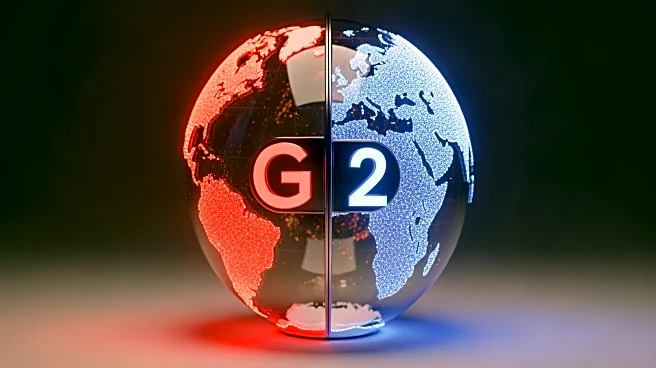What's Happening?
President Trump has reignited the 'G2' concept in U.S.-China relations through a post on Truth Social, indicating a potential shift in diplomatic strategy. The term 'G2', which stands for Group of Two,
was initially proposed in 2005 to emphasize the importance of dialogue between the world's two largest economies. Trump's recent use of the term during a summit with Chinese President Xi Jinping in South Korea has raised concerns among U.S. allies. The concept suggests a power equilibrium between the U.S. and China, which Beijing has long sought as it rises to global prominence. This development has led to apprehension among U.S. allies who fear that the U.S. might prioritize bilateral relations with China over multilateral engagements, potentially leaving them at a disadvantage.
Why It's Important?
The revival of the 'G2' concept by President Trump could have significant implications for global diplomacy and international relations. It suggests a possible shift towards a bilateral focus between the U.S. and China, which may alter existing alliances and geopolitical dynamics. U.S. allies, particularly in Asia, are concerned that this approach might lead to decisions being made without their input, affecting regional stability and their strategic interests. The concept also challenges the traditional multilateral frameworks like the G7 and G20, which involve broader international cooperation. If the U.S. and China were to prioritize their bilateral relationship, it could reshape global economic and political landscapes, impacting trade, security, and diplomatic strategies worldwide.
What's Next?
The potential consequences of President Trump's embrace of the 'G2' concept could lead to increased diplomatic activity and negotiations between the U.S. and China. Observers will be closely monitoring how this approach influences U.S. foreign policy and its interactions with other nations. There may be heightened diplomatic efforts from U.S. allies to ensure their interests are not sidelined in favor of U.S.-China relations. Additionally, the international community will likely scrutinize any agreements or policies that emerge from this bilateral focus, assessing their impact on global governance and economic stability. The situation could prompt discussions on the future of multilateralism and the role of major powers in shaping the world order.
Beyond the Headlines
The ethical and strategic implications of the 'G2' concept are profound, as it challenges the existing balance of power and the principles of multilateral diplomacy. It raises questions about the role of smaller nations in global decision-making and the potential for major powers to dominate international affairs. The concept also highlights the evolving nature of U.S.-China relations, which have been marked by competition and cooperation. As both countries navigate their complex relationship, the 'G2' approach could influence long-term geopolitical strategies, economic policies, and security arrangements. The broader cultural and historical context of China's rise and its quest for global influence adds another layer to the significance of this development.









